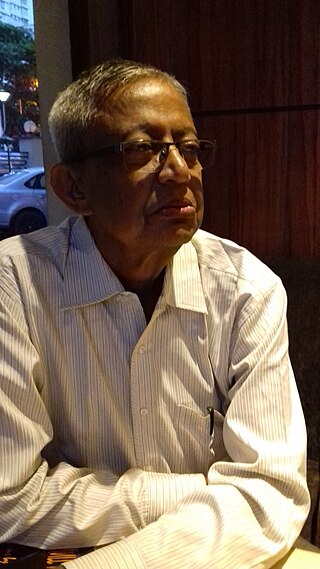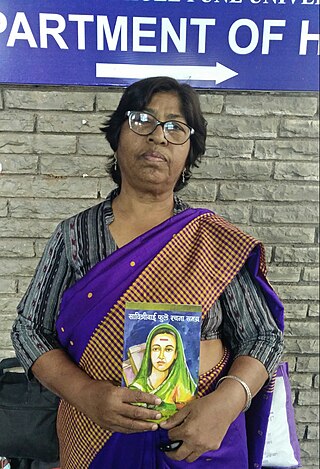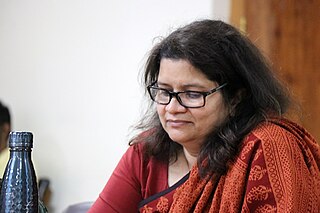Related Research Articles

Mahasweta Devi was an Indian writer in Bengali and an activist. Her notable literary works include Hajar Churashir Maa, Rudali, and Aranyer Adhikar. She was a leftist who worked for the rights and empowerment of the tribal people of West Bengal, Bihar, Madhya Pradesh and Chhattisgarh states of India. She was honoured with various literary awards such as the Sahitya Akademi Award, Jnanpith Award and Ramon Magsaysay Award along with India's civilian awards Padma Shri and Padma Vibhushan.

Dalit is a term first coined by the Indian social reformer Jyotirao Phule for untouchables and outcasts, who represented the lowest stratum of the castes in the Indian subcontinent. Dalits were excluded from the fourfold varna of the caste hierarchy and were seen as forming a fifth varna, also known by the name of Panchama. Several scholars have drawn parallels between Dalits and the Burakumin of Japan, the Baekjeong of Korea and the peasant class of the medieval European feudal system.
Bhatkal & Sen is a publishing partnership between Mandira Sen and Popular Prakashan. The company is based in Kolkata and publishes the imprints Stree and Samya. It is noted for publishing authors such as Kancha Ilaiah, Om Prakash Valmiki, Uma Chakravarti, Gail Omvedt, Manikuntala Sen, Ashok Mitra, V. Geetha, and Bani Basu, and has prominent scholars such as Susie Tharu and Maithreyi Krishnaraj as editors. It publishes academic works in the social sciences, memoirs and classic fiction in translation in English and Bengali.
Bihar has produced a number of poets and writers in its languages like Bhojpuri Maithili language, Magahi language, Angika and Bajjika including Bhikhari Thakur, Heera Dom, Viveki Rai,Satishwar Sahay Verma, Pandey Kapil etc are writers of Bhojpuri, Vidyapati in Maithili. Besides its regional languages, Bihar has also produced writers in English such as Raj Kamal Jha, Amitava Kumar, Tabish Khair, Gunjesh Bond, Abhay K, Kumar Vikram, Siddhartha Chowdhury; and Hindi including Raja Radhika Raman Prasad Sinha, Kumar vansi, Acharya Ramlochan Saran, Acharya Shivpujan Sahay, Divakar Prasad Vidyarthy, Ramdhari Singh 'Dinkar', Ram Briksh Benipuri, Phanishwar Nath 'Renu', Gopal Singh "Nepali", Ramesh Chandra Jha and Baba Nagarjun. Writer and Buddhist scholar Mahapandit Rahul Sankrityayan was born in Uttar Pradesh but spent his life in the land of Buddha, i.e., Bihar. Hrishikesh Sulabh is a short story writer, playwright and theatre critic. Arun Kamal and Aalok Dhanwa are poets.

Ilavenil Meena Kandasamy is an Indian poet, fiction writer, translator and activist from Chennai, Tamil Nadu, India.
Dalit literature is a genre of Indian writing that focuses on the lives, experiences, and struggles of the Dalit community, who have faced caste-based oppression and discrimination for centuries. This literature encompasses various Indian languages such as Marathi, Bangla, Hindi, Kannada, Punjabi, Sindhi, Odia and Tamil and includes diverse narratives like poems, short stories, and autobiographies. The movement originated in response to the caste-based social injustices in mid-twentieth-century independent India and has since spread across various Indian languages, critiquing caste practices and experimenting with different literary forms.
Harichand Thakur, was a social reformer worked among the untouchable people of Bengal Presidency. He formed the Matua sect of Hindus.

The Matua Mahasangha is a Hindu reform movement that originated around 1860 AD in modern-day Bangladesh. Today, it has a considerable number of adherents both in Bangladesh and in West Bengal, India.
Bama , also known as Bama Faustina Soosairaj, is a Tamil Dalit feminist, teacher and novelist. Her autobiographical novel Karukku (1992) chronicles the joys and sorrows experienced by Dalit Christian women in Tamil Nadu. She subsequently wrote two more novels, Sangati (1994) and Vanmam (2002) along with three collections of short stories: Kusumbukkaran (1996) and Oru Tattvum Erumaiyum (2003), 'Kandattam'(2009). In addition to this, she has written twenty short stories.

Urmila Pawar is an Indian writer and activist in the dalit and feminist movements in India and her works, all of which are written in Marathi language, have often been hailed as a critique of social discrimination and the savarna exploitation by commentators and media outlets.

Manoranjan Byapari is an Indian Bengali writer, socio-political activist, and a politician. He stands as one of the pioneering authors in the realm of Dalit literature in Bengali, hailing from the Indian state of West Bengal. Hindered by financial constraints, he was precluded from availing formal education, thereby distinguishing himself as a unique exemplar—a former convict turned rickshaw puller—having authored a substantial corpus comprising twelve novels, in addition to over a hundred short stories and non-fiction essays.

Manohar Mouli Biswas is the pseudonymous appellation adopted by Manohar Biswas, a distinguished and arguably the preeminent bilingual poet, essayist, and luminary figure in Dalit Literature emanating from the Bengal region.

Pramatha Ranjan Thakur was an Indian politician elected as a member of the West Bengal Legislative Assembly from the Hanskhali constituency in the 1962 elections as a candidate of the Indian National Congress. The seat was reserved for candidates from the Scheduled Castes.

Rajni Tilak was one of the most prominent Indian Dalit rights activists and a leading voice of Dalit feminism and writing. She served as the Executive Director of the Centre for Alternative Dalit Media, co-founded the National Association of Dalit Organisations, and served as President of the Dalit Lekhak Sangh.

Dalit feminism is a feminist perspective that includes questioning caste and gender roles among the Dalit population and within feminism and the larger women's movement. Dalit women primarily live in South Asia, mainly in Bangladesh, India, Nepal and Pakistan. Dalit women face different challenges than women in oppressor castes in these countries. They are more likely to be poor, uneducated and socially marginalized. Dalit feminists advocate and have advocated for equal rights for Dalit women based on gender, caste and other issues. They have addressed conferences, created organizations and helped elect other Dalit women into political office.
Vijila Chirappad is an Indian Dalit poet who writes in Malayalam.

Aparna Lanjewar Bose is an Indian trilingual writer, poet, critic, and translator. She is currently working in The English and Foreign Languages University, Hyderabad as an Associate Professor, at the School of Literary Studies. She is an author of several books and articles in Marathi and English.
Guruchand Thakur (1846-1937) was an Indian reformer who works for the upliftment of the untouchable peoples in the Indian society. He leads the Matua sect of Hindus after the death of his father Harichand Thakur. Under his strong leadership, the Matua section achieved a major organizational push and started the Namasudra protest movement in 1872. He established many schools for the upliftment of the Dalit community. He preached the abolition of caste inequality, gender equality via performing secular duties. Matua Movement is one of the first Dalit uprisings in the Indian subcontinent.
References
- 1 2 3 4 5 Ghose, Amita (18 March 2018). "Why Bengali Dalit feminist poet and writer Kalyani Thakur added Charal (for Chandal) to her name". Scroll.in. Retrieved 2020-12-26.
- 1 2 3 4 Sarangi, Jaydeep; Pal, Bidisha (2020-08-02). "Bangla Dalit Womanist Speaks: Interview with Bengali Dalit Writer Kalyani Thakur Charal". Writers in Conversation. 7 (2). doi: 10.22356/wic.v7i2.78 . ISSN 2203-4293.
- 1 2 3 "Through the ceiling of silences". www.telegraphindia.com. Retrieved 2020-12-26.
- 1 2 3 4 "They are using Dalit votes for selfish ends". www.telegraphindia.com. Retrieved 2020-12-26.
- ↑ "Kalyani Thakur Charal". Monash Indigenous Studies Centre. Retrieved 2020-12-26.
- ↑ "Why Dalit Lekhika Is Women's Writing That Delivers A Punch In The Gut". Women's Web: For Women Who Do. 2020-12-09. Retrieved 2020-12-26.
- ↑ Ray, Panchali (2019-07-24). Women Speak Nation: Gender, Culture, and Politics. Taylor & Francis. ISBN 978-1-000-50727-0.
- ↑ Banerjee, Supurna; Ghosh, Nandini (2018-09-17). Caste and Gender in Contemporary India: Power, Privilege and Politics. Taylor & Francis. ISBN 978-0-429-78396-8.